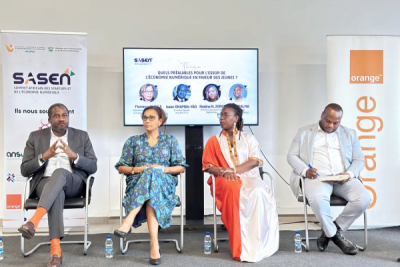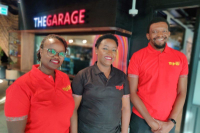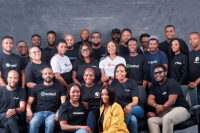The solution was developed by a Cameroonian doctor to offer a customized solution tailored to local realities for affordable access to home healthcare.
Clinic Home is an e-health solution developed by E-santé Cameroun. It enables users to book appointments for home or remote consultations with doctors, general practitioners, or specialists. It also offers home laboratory and online pharmacy services.
Based in Douala, E-santé Cameroun was founded in 2021 by Philippe Ohandja, a trained doctor. Its solution aims to smooth the care pathway. For that purpose, it developed a mobile app -available for Android and iOS users- through which users can register and start booking services. To book the services of a practitioner, they just have to fill a form informing of the type of practitioner they need, when and the type of service they need as well as their conditions.
"Few minutes after payment is made, a teleoperator will call [the user] and forward the call to a doctor who will make an over-the-phone assessment before going to the patient’s home. After the consultation, if necessary, the doctor will ask a nurse to go to the patient for further tests or nursing care,” Philippe Ohandja told We Are Tech Africa at Gitex Africa (May 31-June 2) in Morocco.
If needed, the patient can also buy drugs and directly request for tests right from the mobile app.
A consultation with a general practitioner affiliated with Clinic Home costs CFAF10,000 (around $16.41). The fee rises to CFAF15,000 for consultations at night time or at weekends. Consultations with specialists cost CFAF15,000 at daytime and CFAF20,000 for night and weekend consultations. Teleconsultation, on the other hand, costs CFAF3,000.
The start-up claims around 25,000 users. In 2022, it joined an acceleration program in the Sahel through I&P (investors and partners). Although it has not yet completed a financing round, E-santé Cameroun plans to expand outside Cameroon, starting with Côte d’Ivoire.
Adoni Conrad Quenum
He is a successful entrepreneur and talented computer scientist with a proven track record in several tech companies. With Eden Life, he helps middle-class Africans find competent people to manage household chores.
Nadayar Enegesi (photo) is a Nigerian computer scientist who graduated from the University of Waterloo, Canada, with a Bachelor's degree in 2013. He is the CEO of Eden Life, a start-up he founded in 2019 with Prosper Otemuyiwa.
His startup was born out of both his and his co-founder’s desire to improve the quality of life of middle-class individuals. In Nigeria and Kenya, the startup connects people who provide services such as laundry, cleaning, catering, and equipment maintenance with those in need.
“Eden is the single platform for all domestic services. It's a superior answer to the question of an inferior lifestyle. If you’ve ever wanted to be done with house chores or wanted better services for things like your laundry, meals, house cleaning, maintenance, etc, then you have silently prayed for Eden,” Nadayar Enegesi writes on his Linkedin profile.
The same Linkedin profile informs that prior to founding Eden Life, in 2014, Nadayar Enegesi co-founded Andela, an engineering platform that helps companies build remote teams quickly and affordably. He was also the director of Launchpad, Andela's in-house incubator from January 2018 to April 2019. Still, at Andela, Nadayar Enegesi was the Director of Learning and Development as well as the Director of Engineering and Training.
In 2013, the tech entrepreneur co-founded Fora, a marketplace for North American online courses targeted mainly at African students and emerging professionals. Nadayar Enegesi was the company's CTO until June 2014.
The computer scientist has worked as an IT developer for several technology companies such as Phoenix Interactive, BBS Securities Inc, and MKS. He was OpenText's quality assurance automation specialist in 2011. Between 2015 and 2016, he was an Udacity code reviewer.
Melchior Koba
Nowadays, social networks are no longer simple chatting tools. They can become powerful propaganda tools. Fearing the use some may make of it, governments have sometimes taken extreme measures like banning those networks.
Since the night of Thursday, June 1, access to the social networks Facebook, Twitter, WhatsApp, and Youtube is restricted in Dakar and several other cities across Senegal. By the afternoon, people were already experiencing difficulties in communicating easily on these platforms. Some users thought that it was caused by network disruptions. However, the social media block was confirmed by NetBlocks, an Internet governance watchdog, on its Twitter account.
The ban comes as clashes between security forces and youth groups have escalated in several districts of Dakar, Ziguinchor, Mbour, and Kaolack since yesterday. This conflict came after the announcement, on Thursday morning, that Ousmane Sonko, president of the opposition party Patriotes africains du Sénégal pour le travail, l'éthique et la fraternité (Pastef), had been sentenced to two years in prison for corrupting the youth. Ousmane Sonko has been on trial since 2020 for rape and death threats against one Adji Sarr. He was acquitted of the rape charges and sentenced for another crime, making him ineligible for the February 2024 presidential election.
On May 8, Sonko's eligibility for the presidential election was jeopardized by an initial six-month suspended prison sentence for defamation against the Minister of Tourism, Mame Mbaye Niang.
In a statement by Interior Minister Antoine Félix Abdoulaye Diome, the social network access restrictions were to prevent "the dissemination of hateful and subversive messages". In a press release issued on Thursday afternoon, the Pastef national office called on "the Senegalese people" to "take to the streets" and asked the army and national police to join them.
By blocking access to social networks, the government wants to prevent any mobilization by Ousmane Sonko. Indeed, throughout his legal battle in the Adji Sarr case, he used those tools to rally his supporters, claiming that the rape case is a plot by President Macky Sall's government to oust him from the race for power.
Facebook and Twitter were used on several occasions to relay the demonstrations and grassroots actions carried out by his young supporters. The videos published have sometimes contributed to escalations, resulting in deaths and material destruction during demonstrations.
Muriel Edjo
The 2nd edition of the African Startups and Digital Economy Summit (SASEN) will be held from June 8 to 9 in Abidjan, on the theme of "The digital economy, a tool to drive job creation for the African youth.”
Over 500 start-ups and decision-makers, institutions, investors, development partners, and delegations from 8 countries, including Benin, Senegal, and France, are expected at the summit.
The Baobab Network is one of Africa's leading accelerators. It supports tech start-ups by providing mentoring, acceleration, networking, and funding to help them grow and have a positive impact on their communities.
The Baobab Network is an accelerator that supports the best tech start-ups in Africa, providing entrepreneurs with funding, support and a global platform to grow their businesses.
Founded in Kenya, in 2015, by British Toom Fairburn and Toby Hanington, the accelerator invests up to $50,000 in early-stage tech companies. It has developed a unique, intensive program to ensure the success of each start-up that goes through its training. Each of the startups has access to a network of experts, mentors, corporate partners, and investors to grow their businesses.
Its acceleration program begins with two weeks of intensive consulting to address the most pressing challenges faced by founders, followed by 12 weeks of practical support for founders, during which an acceleration plan is created for each startup.
The acceleration program takes place remotely so that founders are not kept away from their companies for too long. Registrations for the next cohort of the program are already open.
The Baobab Network’s partners offer their expertise and services, run pilot projects, and explore early business partnerships. They also provide grants as well as equity and debt funding to the startups selected by the accelerator.
Over the past five years, The Baobab Network has worked more than 10,000 hours alongside budding entrepreneurs in Africa. Its portfolio of supported start-ups includes advertising agency Adafri, on-demand warehousing company Afrigility, and Alerzo, a platform that empowers retailers.
Melchior Koba
She studied civil engineering and urban planning. After working with various logistics companies, she founded her own company, Jumba, to solve construction challenges in Africa.
Kagure Wamunyu (photo) is the co-founder and CEO of construction tech startup Jumba. The Kenyan-born entrepreneur studied engineering at North Carolina State University, graduating with a Bachelor's in Civil Engineering. She also holds a bachelor's in mathematics from Meredith College (2013) and a doctorate in sustainable urban development from Oxford University (2022)
In 2022, she co-founded (with Miano Njoka) the construction tech company Jumba to ease the supply of building materials. The startup developed a business-to-business platform that seamlessly integrates the building materials supply chain, offering not only a marketplace for building materials manufacturers and suppliers but also a single, reliable source of materials for hardware stores and construction companies. It ensures item delivery and transparency, enabling customers to track their deliveries in real time. The goods marketed on the platform are affordable, as Jumba makes sure that buyers pay no extra charges.
In February 2023, the start-up raised $4.5 million to further expand in Kenya. "Kenya will remain our core market, the opportunity is massive here. We plan to scale in this market to acquire more customers before we explore the next market," said Kagure Wamunyu at the time.
The latter, apart from leading Jumba, is also the co-owner of Lava Latte, a women-run café that offers a conducive space for work meetings and relaxation. Before founding her company in 2022, she was the Global Chief Operating Officer of Kobo 360, a pan-African technology logistics company.
In 2015, she joined Uber Kenya where she worked, for two years successively as Operations Manager and Country Manager. In 2017, she was hired by Bridge International Academies as Senior Strategy Director in East Africa.
In 2018, she made it to the Business Daily Africa’s list of the top 40 Under 40 women.
Melchior Koba
Zydii, a Kenyan platform that offers digital training in technical and soft skills useful for the development of businesses and their employees, has raised pre-seed funding for an undisclosed amount.
The company, which was co-founded in 2017 by computer scientist Joyce Mbaya, plans to use the funds to support its growth in Kenya and finance expansion in Nigeria and South Africa.
The Kenyan government is stepping up its efforts to accelerate the country's digital transformation. To achieve its objectives, the executive is counting on the support of international partners.
Korea Trade Centre (KOTRA) will support Kenya in the development of a master plan to guide the creation of the five digital cities selected by President William Ruto (Lamu, Dongo Kundu, Athi River, Sagana, and Naivasha). For that purpose, on Monday, May 29, in Nairobi, the Kenyan Ministry of ICT and Digital Economy and the KOTRA signed a memorandum of understanding.
The agreement also provides for the implementation of a smart mobility system encompassing an intelligent transport network using smart driving licenses.
According to ICT Principal Secretary John Tanui, the partnership is part of the government's strategies to create an enabling environment for innovation and emerging technologies. The Kenyan government "has played an enabling environment through various legal and regulatory frameworks to spur Kenya’s digital economy such as the National ICT Policy, Digital Economy Blueprint and National ICT Master Plan (2022-2032), among other policy interventions,” said John Tanui.
Indeed, when he came to power in September 2022, President William Ruto vowed his ambition to leverage digital tools for socioeconomic development. To this end, he planned various investments aimed at making the country a benchmark for digital transformation in Africa by 2027. Digital investments supporting this vision have been estimated at Ksh40 billion ($334 million).
The Smart Cities project should not only improve citizens' quality of life but also provide fertile ground for economic growth and job creation. It will offer solutions to the country's energy challenges by, among other things, implementing the Internet of Things (IoT) to strengthen ecosystems and enhance new technologies.
Samira Njoya
To grow and compete with their counterparts around the world, African businesses need stable, low-latency connectivity and digital tools to optimize their activities. Projects are being implemented to enable access to what they need.
Liquid Dataport, a subsidiary of connectivity company Liquid Intelligent Technologies, announced on Wednesday, May 31 the launch of its new fiber optic route linking Mombasa, Kenya, to Muanda in the Democratic Republic of Congo (DRC) via Uganda and Rwanda.
According to the release announcing the launch, this is the shortest route between East and West Africa and will reduce data transmission latency by 20 milliseconds.
“We have a significant number of wholesale, enterprise, and hyperscale customers along this route, and we fully support them in operating their global networks. The availability of our latest and shortest East to West route brings many proven economic and social benefits – from providing access to online educational resources to creating more jobs and driving the adoption of new technologies,” said David Eurin, CEO of Liquid Dataport.
This latest fiber optic route complements Liquid's previous achievement, completed in 2019, linking Dar es Salaam to Muanda on the west coast of the DRC via Zambia. It will bring more reliable and affordable broadband connectivity to over 40 million people who live and work in all the major cities along the route.
The partnership is part of Liquid Intelligent Technologies' "One Broadband Africa" initiative. The company is pursuing its strategy of conquering the African and global markets for broadband connectivity and digital services. In recent months, it has strengthened its presence in Africa by expanding into Nigeria, Egypt, and Algeria. On Thursday, May 25, the company signed an agreement with satellite telecom services provider Viasat to provide high-speed Internet connectivity services in West Africa.
According to Hardy Pemhiwa, CEO of Liquid Intelligent Technologies, this east-west axis will promote digital inclusion by bringing global traffic to the continent, but also by reducing the cost of broadband Internet access across the continent.
Samira Njoya
Techstars recently opened applications for its ARM Labs Lagos Techstars Accelerator program. The program is aimed at start-up founders who want to grow their businesses. Successful applicants will receive up to $120,000 in funding, plus access to a global network of investors, hands-on mentoring, and several other benefits. Applications are due by August 9 at https://apply.techstars.com/?source=nav.
More...
British beverage company Diageo Plc recently announced the launch of its new Africa Digital Hub in Nairobi, Kenya.
The hub will serve Diageo's key markets in Africa, including Kenya, Nigeria, South Africa, and Ghana, and accelerate the company's digital transformation plans on the continent. It will be headed by Waithera Kabiru, former Head of Media Futures at EABL (East African Breweries Limited), a Kenya-based holding company that also manufactures beverages.
In the current digital age, accurate population data is a strategic asset to guide government planning. It informs the most effective actions to be taken before, during, or after any situation with direct or indirect consequences on the lives of millions of individuals.
Earlier today, Togo announced an agreement with French companies Atos and IDEMIA, for the development of a national electronic identification system. The two companies will design, build, test, and deploy a biometric solution that captures and process iris, face, and fingerprint data. On the sidelines of the GITEX Africa trade fair, taking place in Marrakech from May 31 to June 2, 2023, Alpha Barry, CEO of Atos Africa, said: "The biometric e-ID solution will play a crucial role in Togo's digital transformation and national development. Atos is committed to providing a reliable and secure solution that meets the needs of both government and citizens."
The digital solution will include a citizen portal, a mobile application, cybersecurity solutions, a central biometric system, enrolment kits, and a personalization system for the new electronic identity cards. It is a turnkey, integrated end-to-end solution to be built on a scalable infrastructure to meet Togo's current and future needs.
The French companies explain that the project also entails the opening of an Atos subsidiary in Togo to ensure the transfer of knowledge and skills to local staff to guarantee the independent and efficient operation of the system over the long term.
The national electronic identification system will support the national "e-ID Togo" project, which aims to allocate a unique identification number (UIN) to every resident in Togo. Thanks to the UIN and the biometric data collected, Togo will create a centralized, secure, and reliable database that will serve as a reference for verifying the identity of beneficiaries of public, private, or social services.
The project is part of the West African Unique Identification Program for Regional Integration and Inclusion (WURI), with an overall budget of $500 million financed by the World Bank.
Let’s note that the agreement was announced on the sidelines of the GITEX Africa trade fair being held in Marrakech (May 31-June 2).
Adoni Quenum, Marrakech
On January 13, 2022, the Pan-African Payment and Settlement System (PAPSS) was officially launched in West Africa. Despite its impressive benefits, this innovative solution is yet to be widely adopted.
On Monday, May 29, Kenya’s President, William Ruto (photo) called on his peers to take action for the widespread adoption of the Pan-African Payment and Settlement System (PAPSS). He asked them to encourage central and commercial banks to join the system. The official made the call during the African Private Sector Dialogue on the African Continental African Free Trade Area (AfCFTA) held in Nairobi.
“It is also imperative that we proactively seek a resolution to the disparities in currencies and the consequential impediments it poses to intra-African trade. Trade cannot take place without efficient and unified payment systems. [...] There is a mechanism where all our traders can trade in the local currency and we leave it to the Afreximbank to settle all the payments. We do not have to look for dollars; our businessmen will concentrate on moving goods and services and leave the arduous task of currencies to Afreximbank,” he said.
The PAPSS was launched in January 2022, one year after the operationalization of the AfCFTA. It aims to link African markets, enabling instant cross-border payments in local African currencies, whether for purchases, money transfers, salary payments, share trading, or high-value commercial transactions. According to Ghanaian President Nana Akufo-Addo, PAPSS is expected to save Africa 5 billion a year in payment transaction costs. However, most African countries are yet to embrace that innovative system. To date, only nine central banks, 40 commercial banks, and four switches have joined the PAPSS network.
For William Ruto, it is therefore urgent to take the first steps to get rid of the US dollar and mobilize for the adoption of PAPSS.
Samira Njoya
AfriLabs is an organization that promotes collaboration, knowledge sharing, and partnerships in the African tech ecosystem. It has one of the largest networks of innovation centers on the continent.
Networking organization AfriLabs was founded in 2011 to support African tech hubs by providing funding, mentorship, networking opportunities, and capacity-building resources for high-potential entrepreneurs. Led by ecosystem builder Anna Ekeledo, it has a network of 419 innovation centers in 52 African countries.
It offers capacity-building services for entrepreneurs, supports research, and organizes events and programs, among other things. It also provides coworking spaces and office space for entrepreneurs. Some of the programs it organizes include Catalytic Africa, an initiative launched in collaboration with the African Business Angels Network (ABAN) to build the skills of entrepreneurs, start-ups, hubs, and angel investors.
AfriLabs also supports initiatives like the Global EdTech Hub, a program funded by the Foreign Commonwealth and Development Office, the World Bank, and the Bill & Melinda Gates Foundation, to improve education technologies in developing countries.
Each year, AfriLabs organizes the AfriLabs Annual Gathering, which brings together leaders of innovation centers and ecosystem builders on the continent. The annual convention enables all players to learn more about the prospects in the business sectors covered. This year's gathering will take place in Kigali from October 11 to 13.
For its activities, AfriLabs has a wealth of partners including Facebook, Mozilla, GIZ, the French Development Agency, IBM, AfriHive, the World Bank, the Rockefeller Foundation, TechCabal, Google, the Ford Foundation, InfoDev, and Intel.
Melchior Koba














